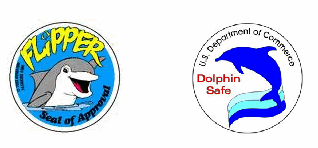In the Eastern Tropical Pacific Ocean, dolphins swim above schools of tunas. When tunas are caught in purse-seine nets, dolphins become collateral damage. The U.S. Marine Mammal Protection Act of 1972, as amended in 1988, fixed a maximum level of dolphin mortality in the fishing operation for U.S. tuna vessels in this area. It also said that tuna was not to be imported from any country whose fisherman destroyed more than 1¼ times as many dolphins as the American fishing fleet did in the same year.
In February 1991, at the urge of environmentalists, the U.S. banned the import of yellowfin tuna products from Mexico and in March 1991, it extended the ban to Venezuelan yellowfin tuna products. A secondary ban on imports of yellowfin tuna products from France, Italy, the U.K. and Spain that imported tuna from Mexico and Venezuela was also imposed.
Mexico took the dispute to the General Agreement on Trade and Tariffs (GATT)1. In September 1991, a GATT dispute-resolution panel ruled that both the primary ban and the secondary ban violated GATT rules. Although this ruling was never formally adopted by the GATT Council, and the dispute died down because Mexico voluntarily took conciliatory steps to protect dolphins, this episode illustrates a potential conflict between enforcement of varying environmental standards in different countries and the promotion of free trade. Specifically, should a country be allowed by GATT to impose unilateral sanctions against its trading partners for having weaker environmental standards?
Killing dolphins is objectionable to many Americans who have been brought up by the Flipper television series, but is it an environmental issue that merits a trade embargo? First, dolphins are not an endangered species and thus not covered by the International Convention on Trade in Endangered Species. Second, how could Mexican tuna fishermen know in advance what the American dolphin kill would be?
Contrary to the protest of U.S. environmentalists, the GATT panel's ruling is not arbitrary. It is based on a reasonable principle that the way the import is produced is not a good reason to discriminate against it. But, U.S. health and environmental laws often regulate the process of production. This GATT principle simply states that such laws cannot be unilaterally applied to other countries, in restraint of trade.
To be generally applicable, GATT requires that health, safety, and environmental laws be "necessary" and "least trade restrictive." This means that such laws should achieve their professed objectives with regulations that are the least costly to comply with and that do not unduly impose higher compliance costs on foreign than domestic producers. (see note)2

As reduced tariffs no longer present significant barriers to trade among industrialized countries, non-tariff trade barriers have dominated discussions in new rounds of trade agreements. Many legitimate domestic policies which are never intended to protect domestic producers have inadvertently become significant barriers to imports. The "flipper" incident is but one notable example.
- The World Trade Organization (WTO) is the successor to GATT since 1995.
- A "dolphin safe" label for example can be used to guide consumers' choice instead of an outright ban of "dolphin unsafe" import.
- Bhagwati, J. "Environmentalists Against GATT," Wall Street Journal. 3/19/1993.
- BNA International Environment Daily. 2/19/1992. "EC Spokesman Condemns U.S. For Marine Mammal Protection Act."
- The Economist. 2/27/1993. "The Greening of Protectionism." 25.
- The Houston Chronicle. 4/6/1993. "We Can Have Free Trade and Clean Environment." A13.
- Los Angeles Times. 9/25/1993. "Mexico Announces a Dolphin Protection Plan." D6.
- The National Law Journal. 3/29/1993. "Free Trade vs. Law."
